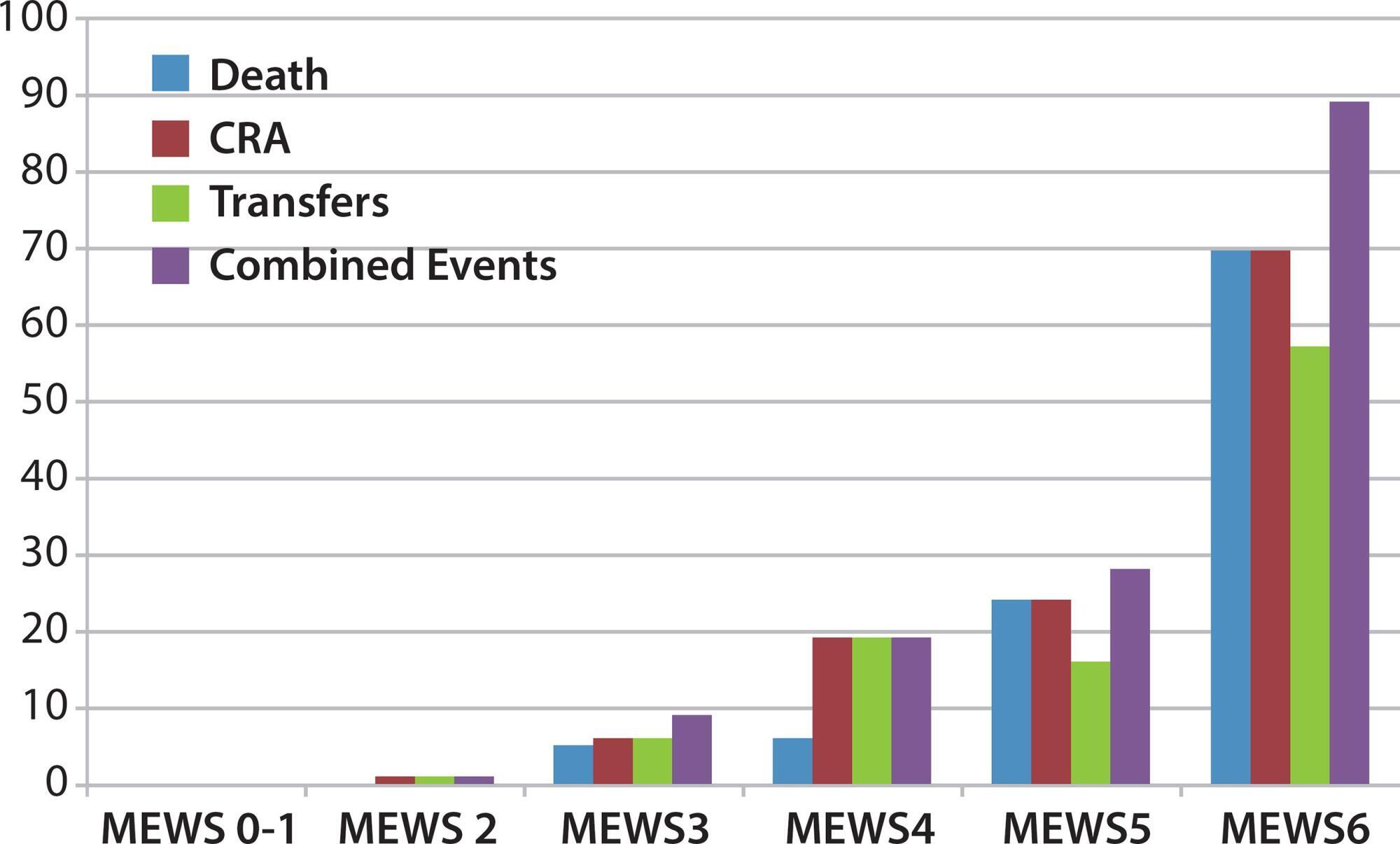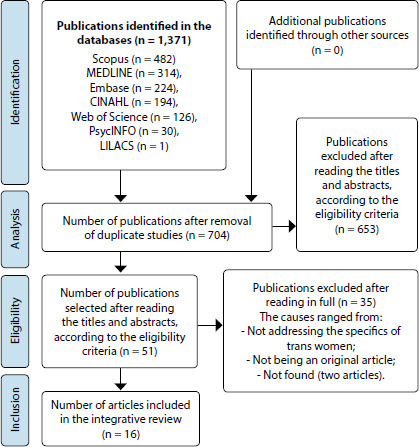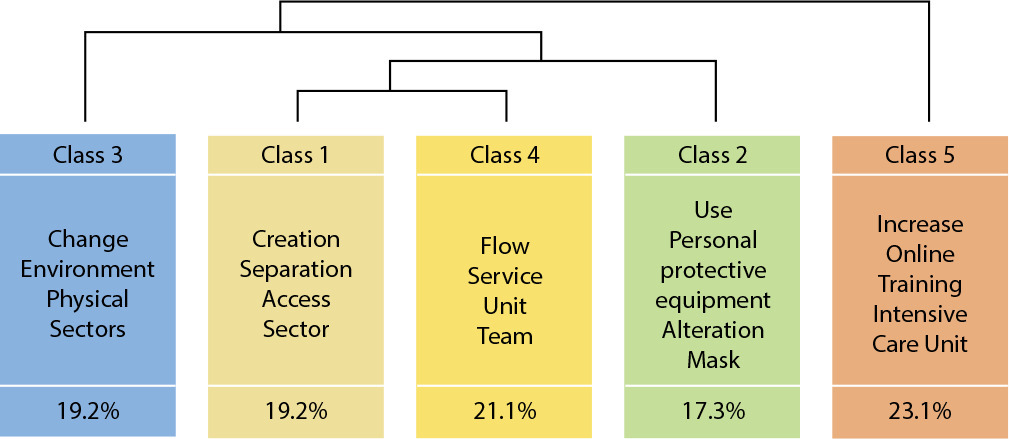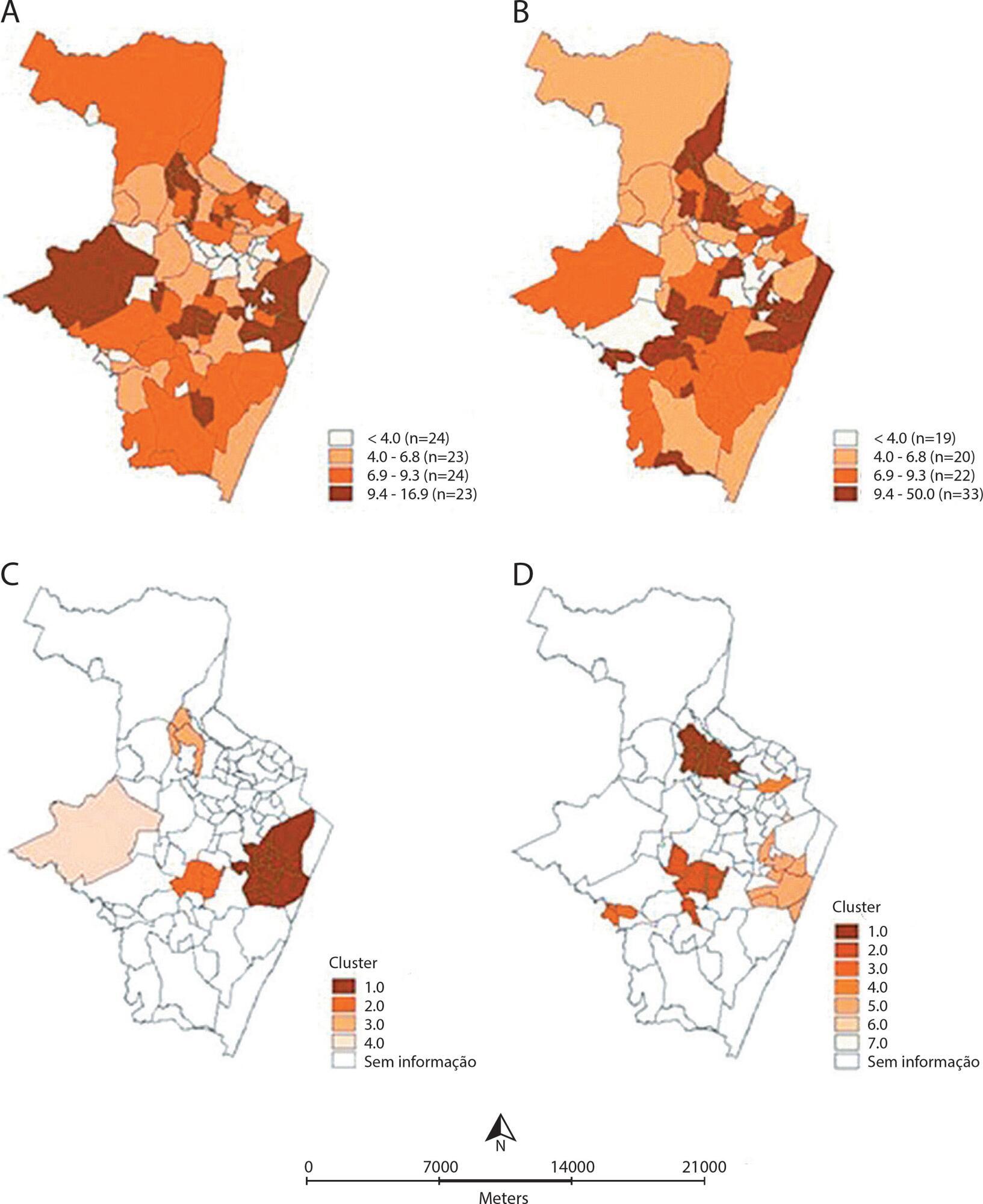-
REVIEW
Staphylococcus aureus meticilino resistente adquirido na comunidade: um problema mundial
Revista Brasileira de Enfermagem. 2015;68(1):136-143
01-01-2015
Abstract
REVIEWStaphylococcus aureus meticilino resistente adquirido na comunidade: um problema mundial
Revista Brasileira de Enfermagem. 2015;68(1):136-143
01-01-2015DOI 10.1590/0034-7167.2015680119p
Views0Objetivo:
descrever a epidemiologia dos casos de CA-MRSA no Brasil de forma a compreender sua ocorrência, fatores de risco associados e formas de manejo em relação à situação mundial.
Método:
revisão integrativa e para seleção dos estudos utilizou-se as bases de dados: Scopus, Science direct, Isi Web of Knowledge, PUBMED e BVS.
Resultados:
foram identificados dez artigos nacionais que descreveram 21 casos de CA-MRSA principalmente em crianças, adolescentes e adultos com quadro de infecção de pele e tecidos moles evoluindo para infecções graves relacionados ao clone Oceania Southwest Pacific Clone (OSPC) que resultaram em hospitalização.
Conclusão:
apesar do CA-MRSA ser considerado um micro-organismo de relevância mundial verificou-se a escassez de dados publicados sobre sua epidemiologia no Brasil, o que dificultam o delineamento da realidade do país frente ao CA-MRSA.
Keywords:Controle de InfecçõesFarmacorresistência BacterianaInfecções Comunitárias AdquiridasStaphylococcus Aureus Resistente à MeticilinaSee more -
REVIEW
Prevention and non-pharmacological management of pain in newborns
Revista Brasileira de Enfermagem. 2015;68(1):131-135
01-01-2015
Abstract
REVIEWPrevention and non-pharmacological management of pain in newborns
Revista Brasileira de Enfermagem. 2015;68(1):131-135
01-01-2015DOI 10.1590/0034-7167.2015680118i
Views0See moreObjective:
to describe the main non-pharmacological interventions for pain relief in newborns available in Neonatal Intensive Care Unit.
Method:
an exploratory search of the MedLine, Lilacs and Scielo online databases was conducted to retrieve references of studies published from 2004 to 2013.
Results:
several non-pharmacological interventions were shown to be effective, to represent low risk for neonates and to have a low operational cost. The ones most often discussed in the literature were: oral administration of glucose/sucrose, non-nutritive sucking, breastfeeding, skin-to-skin contact, facilitated tucking and swaddling.
Conclusion:
healthcare teams should be familiar with these methods and use them more effectively in Neonatal Intensive Care Unit daily routines, so as to ensure that newborns receive qualified and more human care.
-
BANFISA e (IN)DICA-SUS na graduação em saúde: o lúdico e a construção de aprendizados
Revista Brasileira de Enfermagem. 2015;68(1):124-130
01-01-2015
Abstract
BANFISA e (IN)DICA-SUS na graduação em saúde: o lúdico e a construção de aprendizados
Revista Brasileira de Enfermagem. 2015;68(1):124-130
01-01-2015DOI 10.1590/0034-7167.2015680117i
Views0See moreObjectives:
to analyze the learning built during the matches of the games by students of the subject Gestão de Políticas Públicas em Saúde at the Universidade de Brasília.
Method:
exploratory, descriptive research, in a qualitative approach, with 26 students from various graduation courses in health, using a questionnaire and participant observation.
Results:
participants reinvented rules, related issues addressed in the games to the reality, interacted with colleagues and had fun throughout the match. Comparing the games in relation to ludicity, the BANFISA was more attractive than the (IN) DICA-SUS, although they are complementary.
Conclusions:
learning constructed by the students goes beyond the content of the subject; involve the active participation in group and creativity.
-
Chinese auriculotherapy to improve quality of life of nursing team
Revista Brasileira de Enfermagem. 2015;68(1):117-123
01-01-2015
Abstract
Chinese auriculotherapy to improve quality of life of nursing team
Revista Brasileira de Enfermagem. 2015;68(1):117-123
01-01-2015DOI 10.1590/0034-7167.2015680116p
Views0See moreObjective:
to evaluated the effi cacy of auriculotherapy for improving quality of life and reducing stress in nursing staff.
Method:
single-blind radomizad clinical trail envolving 175 subjects randomized in: Control (G1), Protocol Group (G2) and without Protocol Group (G3). They were evaluated by the Stress Symptoms List and SF36v2 at baseline, after 12 sessions and follow up (30 days), between January and July 2012.
Results:
both intervention groups reduced stress (p <0.05) with greater effect for G3 (d = 1.15). G3 was also higher for improving life quality especially the physical domain (p = 0.05).
Conclusion:
individualized auriculotherapy (G3) had greater effect compared to the protocol auriculotherapy (G2) for reducing stress and improving life quality.

-
Adherence to foot self-care in diabetes mellitus patients
Revista Brasileira de Enfermagem. 2015;68(1):111-116
01-01-2015
Abstract
Adherence to foot self-care in diabetes mellitus patients
Revista Brasileira de Enfermagem. 2015;68(1):111-116
01-01-2015DOI 10.1590/0034-7167.2015680115p
Views0See moreObjective:
to analyze the self-care of patients with type 2 diabetes mellitus in the Family Health Strategy in Teresina-PI.
Method:
search cross selected by simple random sampling, 331 people with diabetes mellitus. Data collection took place from August to December 2012 with the use of Self-Care Activities Questionnaire with Diabetes and structured instrument for recording information socioeconomic and guidance received by the professional nurse.
Results:
the data revealed that patients have poor adherence to blood glucose monitoring, the physical exercise and foot care, but with good adherence to the medication. Only 38.7% of the sample examined the feet of fi ve to seven days a week. Statistically signifi cant association between self-care activities with their feet and orientations of nurses (p < 0,05).
Conclusion:
that there is need to raise awareness with regard to the development of skills for self-care.

-
Patients with disorders of consciousness: vital, facial and muscular responses to music or messages
Revista Brasileira de Enfermagem. 2015;68(1):102-110
01-01-2015
Abstract
Patients with disorders of consciousness: vital, facial and muscular responses to music or messages
Revista Brasileira de Enfermagem. 2015;68(1):102-110
01-01-2015DOI 10.1590/0034-7167.2015680114p
Views0See morePurposes:
to compare vital signs, facial expression and basal electroneurographic signs with measures during stimuli music, message or “silence” in coma patients, vegetative status or sedated; and relating the score of Glasgow Results Scale with the intervention realized.
Method:
a Monoblind Transversal Controlled Clinical Trial to researcher. The distribution, among the three groups, was randomized (experiment with music, experiment with message or control). Two assessments (sessions) were performed with interval of 40 minutes on the same day.
Results:
most of the 76 patients were male, between 18 to 36 years old and hospitalized due to trauma. Statistically signifi cant changes were found in the variables referred to temperature, facial expression, electroneurography and Glasgow Results Scale; more frequent alterations in second session, in coma and vegetative patients, in frontal muscles and in experiment group.
Conclusions:
the facial expression and the electroneurography seem to be more trustworthy variables than vital signs to evaluate consciousness.
-
Prevalence of minor psychiatric disorders in socio-educational agents in the state of Rio Grande do Sul
Revista Brasileira de Enfermagem. 2015;68(1):93-101
01-01-2015
Abstract
Prevalence of minor psychiatric disorders in socio-educational agents in the state of Rio Grande do Sul
Revista Brasileira de Enfermagem. 2015;68(1):93-101
01-01-2015DOI 10.1590/0034-7167.2015680113p
Views0See moreObjective:
to determine the prevalence and factors associated with minor psychiatric disorders (MPD) in socio-educational agents.
Method:
it is a cross-sectional study with 381 socio-educational agents the Centers for Socio-Educational Services in the State of Rio Grande do Sul, Brazil. The Brazilian versions of the Scale of Demand-control-social support at work and the Self Reporting Questionnaire-20 have been applied.
Results:
the results showed a prevalence of suspicion MPD of 50.1%. They showed to be related to suspicion of MPD : being female (55.7%), having age up to 44 years old (58.5%), no physical activity (57.4%), do not have time for leisure (75%), make use of medication (61.4%), require medical attention (56.9%) and psychological counseling (72.7%), not being satisfied with the workplace (61.7%) and need for time off from work (65.6%).
Conclusion:
the study provides important data about the mental health of agents, showing the need for the involvement of managers and of the health service of worker’s health in planning actions to promote health of these workers.
-
Factors associated with immunization against Hepatitis B among workers of the Family Health Strategy Program
Revista Brasileira de Enfermagem. 2015;68(1):84-92
01-01-2015
Abstract
Factors associated with immunization against Hepatitis B among workers of the Family Health Strategy Program
Revista Brasileira de Enfermagem. 2015;68(1):84-92
01-01-2015DOI 10.1590/0034-7167.2015680112p
Views0See moreObjective:
to investigate the report of vaccination against Hepatitis B, verification of immunization and the factors associated with dosages of anti-HBs.
Method:
we collected blood samples from those reported that they had one or more doses of the vaccine. We evaluated the association of the dosage of anti- HBs with sociodemographic conditions, occupational and behavioral. The associations were verified by Mann Whitney and Kruskal Wallis and correlation Spermann by linear regression using SPSS® 17.0.
Results:
among the 761 respondents, 504 (66.1%) were vaccinated, 52.5 % received three doses, 30.4 % verified immunization. Of the 397 evaluated for the determination of anti-Hbs, 16.4% were immune.
Conclusion:
it was found that longer duration of work was associated with higher levels of anti-HBs, while levels of smoking were inversely associated with anti-HBs. These workers need for vaccination campaigns.
-
ORIGINAL ARTICLE
Evaluation of the performance of the modified early warning score in a Brazilian public hospital
Revista Brasileira de Enfermagem. 2019;72(6):1428-1434
10-21-2019
Abstract
ORIGINAL ARTICLEEvaluation of the performance of the modified early warning score in a Brazilian public hospital
Revista Brasileira de Enfermagem. 2019;72(6):1428-1434
10-21-2019DOI 10.1590/0034-7167-2017-0537
Views0ABSTRACT
Objective:
To evaluate the performance of the modified early warning score (Mews) in a nursing ward for patients in clinical deterioration.
Method:
This is an analytical, quantitative and predictive study. Mews’ parameters (systolic blood pressure, heart rate, respiratory rate, temperature and level of consciousness) were evaluated every six hours. The following events were reported: death, cardiopulmonary arrest and transfer to intensive care. The evaluations were performed in a hospital of reference in the state of São Paulo, Brazil.
Results:
A total of 300 patients were included (57 ± 18 years old, males: 65%). There number of combined events was observed to be greater the higher the score’s value (00%; 00%; 01; 09%; 19%; 28%; 89%, respectively, for Mews 0; 1; 2; 3; 4; 5 and 6; p < 0.0001). Mews ≥ 4 was the most appropriate cut-off point for prediction of these events (sensitivity: 87%, specificity: 85% and accuracy: 0.86).
Conclusion:
Mews properly measured the occurrence of severe events in hospitalized patients of a Brazilian public hospital’s nursing ward. Mews ≥ 4 seems to be the most appropriate cut-off point for prediction of these events.
Keywords:Critical CareEmergency MedicineNursing CareOrgan Dysfunction ScoresRapid Response Teams in HospitalsSee more
-
ORIGINAL ARTICLE
Nursing professionals’ biosafety in confronting COVID-19
Revista Brasileira de Enfermagem. 2022;75:e20201104
10-18-2022
Abstract
ORIGINAL ARTICLENursing professionals’ biosafety in confronting COVID-19
Revista Brasileira de Enfermagem. 2022;75:e20201104
10-18-2022DOI 10.1590/0034-7167-2020-1104
Views0See moreABSTRACT
Objective:
To investigate the nursing professionals’ biosecurity in confronting COVID-19.
Methods:
This is a Survey type study. Nursing professionals were invited via messaging apps, using self-applied data collection forms. The sample selection (n=693) was non-probabilistic. A descriptive data analysis was conducted.
Results:
considering the biosafety aspects in facing COVID-19, 79.0% of the participants had not received training or considered it insufficient, 69.3% reported the lack of personal protective equipment during work, and 81.8% did not feel safe with the internal flux adaptations for handling COVID-19 cases.
Conclusion:
Continuous and effective nursing team training and personal protective equipment availability are necessary, as well as internal flow adjustments for attending suspected or confirmed cases.
-
ORIGINAL ARTICLE
The association between knowledge about HIV and risk factors in young Amazon people
Revista Brasileira de Enfermagem. 2020;73(5):e20190453
07-08-2020
Abstract
ORIGINAL ARTICLEThe association between knowledge about HIV and risk factors in young Amazon people
Revista Brasileira de Enfermagem. 2020;73(5):e20190453
07-08-2020DOI 10.1590/0034-7167-2019-0453
Views0See moreABSTRACT
Objectives:
analyze the association between the level of HIV knowledge among young people from Amazonas region, their sociodemographic profile and infection risk factors.
Methods:
cross-sectional analytical study, which used a structured questionnaire containing questions about sociodemographic, behavioral aspects and HIV knowledge. Data were grouped by sex and underwent ordinal and binary logistic regression analysis.
Results:
the students had an HIV knowledge deficit, associated with a low educational level of their parents and low family income. The most frequent risk factors were lack of knowledge on the part of female students regarding proper male condom use, their infrequent use in sexual relations and failure to do HIV testing. There was an association between level of knowledge and use of dating apps by female students.
Conclusions:
there was no association between level of knowledge and the preponderant risk factors, but the students’ knowledge deficit rendered them more vulnerable to infection.
-
REVIEW
Gender violence perpetrated against trans women
Revista Brasileira de Enfermagem. 2022;75:e20210173
03-07-2022
Abstract
REVIEWGender violence perpetrated against trans women
Revista Brasileira de Enfermagem. 2022;75:e20210173
03-07-2022DOI 10.1590/0034-7167-2021-0173
Views0See moreABSTRACT
Objectives:
to identify scientific evidence on gender violence perpetrated against trans women.
Methods:
integrative review, carried out in June 2020, without time frame, in the Scopus, MEDLINE, Embase, CINAHL, WoS, PsycInfo and LILACS databases. The controlled descriptors of DeCS, MeSH and their entry terms were used: “Transgender People”, “Transgender”, “Gender Identity”, “Transsexuality”, “Gender Violence”, “Aggression”, “Sexual Offenses”, “Rape”, “Violence”, “Domestic Violence”. The presentation and synthesis of the results were presented in the PRISMA-2009 flowchart.
Results:
the final sample, consisting of 16 articles, identified different types of violence (sexual, physical, verbal, psychological and financial), perpetrated by family members, strangers, police officers, intimate partners, health professionals, acquaintances, or friends.
Conclusions:
trans women suffer violence and social exclusion that result from stigma and discrimination due to gender identity and result in unrestricted damage to physical health.

-
ORIGINAL ARTICLE
Changes implemented in the work environment of nurses in the COVID-19 pandemic
Revista Brasileira de Enfermagem. 2022;75:e20201381
11-29-2022
Abstract
ORIGINAL ARTICLEChanges implemented in the work environment of nurses in the COVID-19 pandemic
Revista Brasileira de Enfermagem. 2022;75:e20201381
11-29-2022DOI 10.1590/0034-7167-2020-1381
Views0See moreABSTRACT
Objective:
to describe the changes implemented in the work environment of nurses in university hospitals considering the COVID-19 pandemic.
Methods:
this qualitative and descriptive research was developed from an online survey with 75 nurses from three Brazilian university hospitals. Data processing occurred through textual analysis with the aid of software IRAMUTEQ.
Results:
five semantic classes were obtained: Organization of units for exclusive care of patients with COVID-19; Adaptations in the use of personal protective equipment; Physical structure adaptation; Care flow institution; Increased number of beds and training courses. Final considerations: the results show the effort of healthcare and nursing professionals/managers in the development of structural adaptations and reorganizations of care processes, in the hospital context, to respond with quality and efficiency to the demands arising from the COVID-19 pandemic.

-
ORIGINAL ARTICLE
Women’s perception of labor and birth care: obstacles to humanization
Revista Brasileira de Enfermagem. 2022;75:e20210215
03-07-2022
Abstract
ORIGINAL ARTICLEWomen’s perception of labor and birth care: obstacles to humanization
Revista Brasileira de Enfermagem. 2022;75:e20210215
03-07-2022DOI 10.1590/0034-7167-2021-0215
Views0See moreABSTRACT
Objectives:
to understand women’s perception regarding the care received during labor and birth.
Methods:
this is a descriptive-exploratory, qualitative study carried out with 54 postpartum women from hospitals in the Metropolitan Region II of the state of Rio de Janeiro, from January to December 2018, using semi-structured interviews submitted to content analysis.
Results:
puerperal women’s perceptions about the childbirth care they received indicated the use of interventions, such as pressure maneuvers on the uterine fundus during the expulsion period – Kristeller maneuver, episiotomy and repeated vaginal examination and without consent. The use of institutional routines, such as zero diet, horizontal birth and disrespect.
Final Considerations:
despite the encouragement of public humanization policies, the technocratic model is still present in obstetric care during childbirth. The humanization of obstetric care requires changes in attitudes and care paradigms, in order to guarantee respect and the right to quality care.
-
ORIGINAL ARTICLE
Permanent education for good practices in the prevention of pressure injury: almost-experiment
Revista Brasileira de Enfermagem. 2019;72(6):1646-1652
10-21-2019
Abstract
ORIGINAL ARTICLEPermanent education for good practices in the prevention of pressure injury: almost-experiment
Revista Brasileira de Enfermagem. 2019;72(6):1646-1652
10-21-2019DOI 10.1590/0034-7167-2018-0778
Views0See moreABSTRACT
Objective:
To verify the effectiveness of the educational intervention through the evaluation of nurses’ knowledge about prevention of pressure injury.
Method:
A quasi-experimental study with a single group, carried out with 95 nurses from a teaching hospital in the interior of Minas Gerais, in August and September 2017. As a teaching strategy, the active methodology and hybrid teaching were used, based on the reference of the Method of the Arch of Charles Maguerez. Data were collected from a validated instrument, called the Pieper Knowledge Test, and analyzed by descriptive statistics and Student’s t-test with significance level of p <0.001.
Results:
The mean number of correct answers obtained by the nurses was 78.8% in the pre-test and 88.8% in the post-test, and the difference was statistically significant (p <0.001).
Conclusion:
The educational intervention developed was effective, since it contributed to the improvement of nurses’ knowledge.

Search
Search in:
Nuvem de Tags
Aged (144) Atenção Primária à Saúde (239) COVID-19 (104) Cuidados de Enfermagem (269) Educação em Enfermagem (151) Educação em Saúde (139) Enfermagem (930) Estudos de Validação (131) Health Education (144) Idoso (208) Mental Health (149) Nursing (987) Nursing Care (306) Patient Safety (151) Primary Health Care (284) Qualidade de Vida (104) Quality of Life (106) Saúde Mental (145) Segurança do Paciente (150) Validation Studies (108)




